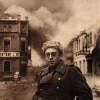Vasily Grossman

Vasily Grossman
Vasily Semyonovich Grossmanwas a Soviet Russian writer and journalist. Grossman was trained as an engineer and worked in the Donets Basin, but changed his career in the 1930s and published short stories and several novels. At the outbreak of the Second World War, he became a war correspondent for the Red Army newspaper Krasnaya Zvezda, writing firsthand accounts of the battles of Moscow, Stalingrad, Kursk and Berlin. Grossman's eyewitness accounts of a Nazi extermination camp, following the discovery of Treblinka,...
NationalityRussian
ProfessionJournalist
Date of Birth12 December 1905
CountryRussian Federation
The divine impeccability of the immortal [Soviet] State turned out not only to have suppressed individual human beings but also to have defended them, to have comforted them in their weakness, to have justified their insignificance. The State had taken on its own shoulders the entire weight of responsibility; it had liberated people from the chimera of conscience.
Human groupings have one main purpose: to assert everyone’s right to be different, to be special, to think, feel and live in his or her own way. People join together in order to win or defend this right. But this is where a terrible, fateful error is born: the belief that these groupings in the name of a race, a God, a party or a State are the very purpose of life and not simply a means to an end. No! The only true and lasting meaning of the struggle for life lies in the individual, in his modest peculiarities and in his right to these peculiarities.
There was something terrible, but also something sad and melancholy in this long cry uttered by the Russian infantry as they staged an attack. As it crossed the cold water, it lost its fervour. Instead of valour or gallantry, you could hear the sadness of a soul parting with everything that it loved, calling on its nearest and dearest to wake up, to lift their head from their pillows and hear for the last time the voice of a father, a husband, a son or a brother...
Human history is not the battle of good struggling to overcome evil. It is a battle fought by a great evil struggling to crush a small kernel of human kindness.
Good men and bad men alike are capable of weakness. The difference is simply that a bad man will be proud all his life of one good deed - while an honest man is hardly aware of his good acts, but remembers a single sin for years on end.
Why do people have memories? It would be easier to die - anything to stop remembering.
Thousands of people are being buried and no one attends the funerals,' said one of the soldiers. 'In peacetime it's the other way round: one coffin and a hundred people carrying flowers.
There are people whose souls have just withered, people who are willing to go along with anything evil - anything so as not to be suspected of disagreeing with whoever is in power.
Humanity will live as long as there are humans.
There is a deep and undeniable sadness in all this: whenever we see the dawn of an eternal good that will never be overcome by evil – an evil that is itself eternal but will never succeed in overcoming good – whenever we see this dawn, the blood of old people and children is always shed.
There's nothing more difficult than saying goodbye to a house where you've suffered.
I have written only what I have thought through, felt through and suffered through.
He was endowed with the extraordinary powers of endurance characteristic of madmen and simpletons.
I don't believe in your "Good". I believe in human kindness.